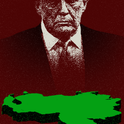Nearly six months after the federal election last September it looks as though Germany will finally get a government. A ballot of the membership of the Social Democrat Party (SPD) resulted in a decisive, albeit unenthusiastic, majority in favour of another Grand Coalition.
It is a second choice government. The Social Democrats originally refused to go into a coalition again as a junior partner. But when talks between Angela Merkel’s Christian Democrats (CDU), the Free Democrats and the Greens broke down they changed their minds.
And it is a government of losers. In the election both of the two big parties, Christian and Social Democrats, recorded their worst ever performances. The Christian Democrats were down to 33 per cent of the vote compared with 41 per cent four years earlier. The Social Democrats fell from 26 per cent to 20 per cent. Since then both parties have lost even more support. The Christian Democrats, having at one point dipped below 30 per cent in the polls, are now hovering around 32 per cent. The Social Democrats are down to under 18 per cent: one poll even showed them behind the right wing Alternative für Deutschland.
“For the Social Democrats the real challenge now is survival”It is also a government without much ambition. The coalition agreement runs to 13 chapters and 177 pages and covers a vast range of issues. But it consists mostly of bland aspirations to virtue. There are few new initiatives—a commission to review the arrangements for health insurance, some tinkering with labour laws, some increases in the budgets for both defence and development aid—but overall it is more of a steady as you go agenda than a reforming one.
For the Social Democrats the real challenge now is survival. Will they follow the socialist parties in France and the Netherlands into political oblivion? Or can they find a profile, and a leadership, that chimes better with the German public mood?
The signs are not encouraging. Their candidate for the Chancellorship, Martin Schulz, formerly President of the European Parliament, turned out to be a disaster. Lacking in charisma and out of touch with the electorate he floundered in the job; and when he reneged on a promise not to serve in government himself and tried to become the next Foreign Minister the Party ran out of patience and he stepped down. His likely successor as Party Chairman, Andrea Nahles, is a former Minister of Labour who comes from the left wing of the party. There is nothing in her record so far that suggests that she will appeal to voters beyond the diminishing party faithful.
For the Christian Democrats the issue is succession. Merkel has implied that this will be her last term as Chancellor; and her selection of ministers for the new government seems to reflect succession planning.
She has brought in several new faces from the younger generation. Two of them, Julia Kloeckner at Agriculture and Jens Spahn, the Health Minister, are potential future leaders. So is Ursula von der Leyen, the Defence Minister, who stays on from the previous Cabinet. But the most hotly tipped is Annegret Kramp-Karrenbauer, the former Minister President of Saarland, who becomes the General Secretary of the CDU, the post which Merkel herself used as a springboard to the leadership of the party.
“Though in her last term as Chancellor, Merkel is no lame duck”Merkel’s authority has been weakened by the delay in forming a government and by the speculation over who will succeed her. But she is still the dominant figure in both German and European politics. The German economy is booming and the German social model remains attractive and unchallenged. Though she may be in her last term as Chancellor, she is no lame duck.
But she will no longer have the support of her former Finance Minister, Wolfgang Schaeuble. His successor, who will also be Vice-Chancellor, will be Olaf Scholz, the Social Democrat former Mayor of Hamburg. Securing the Finance Ministry (as well as the Foreign Ministry) was the SPD’s big achievement in the coalition negotiations and losing it was, in Merkel’s words, painful for the CDU.
Scholz, though a fiscal conservative, is less associated with the mantra of budgetary austerity than Schaeuble. He has already said that he is less inclined to tell other European Union member states how to run their affairs; and the coalition agreement acknowledges that Germany’s contribution to the EU budget will have to rise and supports the conversion of the European Stability Mechanism into a permanent European Monetary Fund.
But President Macron and others should not count too many chickens. The main political concern in Germany now is immigration. Spending money on infrastructure projects in other EU countries or offering facilities for common credit will be no more popular under this government than they were before.
And Brexit? It is barely mentioned in the coalition agreement and was not discussed at all in the negotiations. It’s not something to which the new German government will pay much attention.












